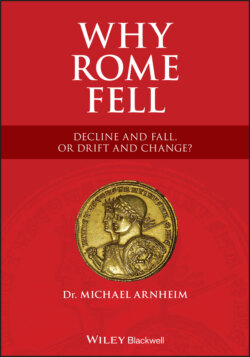Читать книгу Why Rome Fell - Michael Arnheim - Страница 37
Augustus: “Optimi Status Auctor”?
ОглавлениеSuetonius quotes an edict in which Augustus expresses the hope that he will be remembered by posterity as optimi status auctor (architect of the best state of affairs). (Suetonius, Augustus, 28.) In the Aeneid, similarly, Vergil predicts that Augustus will usher in aurea saecula (golden centuries) (Vergil, Aeneid VI. 791–807), a prediction that would prove prophetic.
But what was the nature of the regime that Augustus established? My own view is that Augustus was decidedly the sole ruler of the Roman world. To sum up my findings, Augustus’s position depended on the following factors:
Duly authorized maius imperium, initially as a consul and then later as a proconsul, enabling Augustus to override any other magistrate, including a consul;
Duly authorized tribunician power, with the wide powers described above;
The support of the urban plebs as their effective patron;
The support of the equites;
Auctoritas (influence) stemming from his connections and achievements;
The support of the army, which, however, was not the mainstay of his power;
Amicitia, a wide-ranging network of people linked to Augustus as their individual patronus or simply as amici, some of whom he would consult either formally, in the form of a consilium (council), or informally, inter amicos (among friends) but who had no decision-making powers. Contrary to Ronald Syme, this group did not constitute a party or an oligarchy of any kind (see below); and
Money: Augustus inherited Julius Caesar’s fortune to which he added the treasure of Egypt and other conquests. From this great fortune, which he had amassed, he was able to make lavish gifts to the people of Rome and others as is documented in the Res Gestae Divi Augusti. (See above.)
